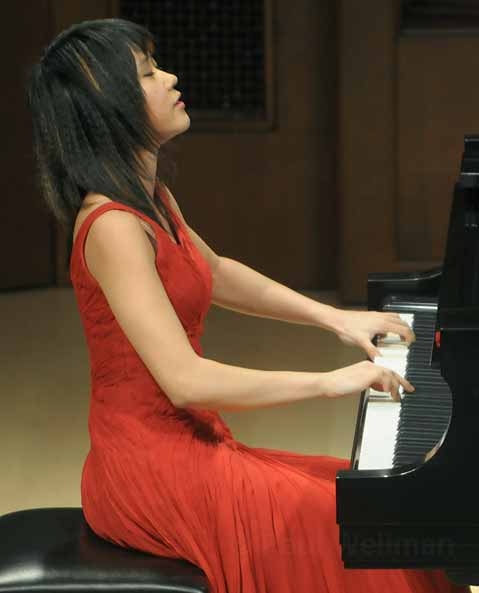Yuja Wang Plays Hahn Hall, April 8
Young Pianist Achieves Greatness
Yuja Wang may be just 22 years old, but her playing at this concert awakened nearly a century’s worth of sleeping piano giants.
She opened with four short, one-movement sonatas by Domenico Scarlatti. These brilliant miniatures are well-known tests of skill that are forever marked by the genius of Vladimir Horowitz, who, with his dazzling speed and powerful virtuosity, first made them world famous almost 90 years ago. It was as if Wang had chosen them to imply that a new golden age of the keyboard has arrived. Her runs were brilliant and without showboating, her technique was precise, and the tone remained carefully controlled throughout, a vehicle for expression rather than an attention-getting disguise. Elegant in a bright red gown, Yang appeared to be lost in the music, and then, immediately after the piece and amid rapturous applause, understandably had trouble finding the hidden door that offers exit from Hahn Hall’s stage.

The failed exit turned out well for everyone concerned, as it sent Wang back into the music almost without a pause; she simply sat back down and began the Brahms. Johannes Brahms’s Variations on a Theme by Paganini, Op. 35 is another instantly recognizable staple from the great modern era of the recital, and Wang made it as thrilling as though it were being played for the very first time. The mad, death-defying tempo with which she attacked left the audience slack-jawed. But that was only the beginning, as each section revealed another layer to this shimmering, multifaceted account. Without altering the piece’s fundamentals in the slightest, Wang nevertheless reinvented its sound and impact for a new century. In a program full of excellent playing, this was the evening’s outstanding highlight.
After the interval, Wang returned, this time in a blue gown, for works by Frederic Chopin and Igor Stravinsky. Chopin’s Piano Sonata in B-flat Minor, Op. 35 contains the familiar “Funeral March” as its third movement, and is one of the most recognizable compositions in the history of Western music. Again, Wang brought lightening speed, dexterity, and huge dynamics into the service of her idiosyncratic, sidelong interpretation. If it worked perhaps less well than the Brahms, that is still leaving room for it to have been quite brilliant, which it was. The Stravinsky that followed, Three Movements from Petrushka, gave Wang yet another opportunity to dazzle, and left the audience wanting more, which she gave in the form of a tender operatic encore.



